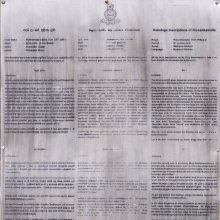Vola: 8 definitions
Introduction:
Vola means something in Hinduism, Sanskrit, Jainism, Prakrit, biology. If you want to know the exact meaning, history, etymology or English translation of this term then check out the descriptions on this page. Add your comment or reference to a book if you want to contribute to this summary article.
Images (photo gallery)
In Hinduism
Sports, Arts and Entertainment (wordly enjoyments)
Source: archive.org: Syainika Sastra of Rudradeva with English Translation (art)Vola (वोल) refers to “gum-myrrh” (used in the treatment of Hawks), according to the Śyainika-śāstra: a Sanskrit treatise dealing with the divisions and benefits of Hunting and Hawking, written by Rājā Rudradeva (or Candradeva) in possibly the 13th century.—Accordingly, [while discussing the treatment of hawks]: “[...] If the disease is caused by hurt, meat is to be given with gum-myrrh (vola) [volayugmāṃsaṃ], even though there is pain in the limbs. The body is to be besmeared with turmeric and it should be sprinkled over with stale water. [...]”.

This section covers the skills and profiencies of the Kalas (“performing arts”) and Shastras (“sciences”) involving ancient Indian traditions of sports, games, arts, entertainment, love-making and other means of wordly enjoyments. Traditionally these topics were dealt with in Sanskrit treatises explaing the philosophy and the justification of enjoying the pleasures of the senses.
Biology (plants and animals)
Source: Google Books: CRC World Dictionary (Regional names)Vola in India is the name of a plant defined with Commiphora myrrha in various botanical sources. This page contains potential references in Ayurveda, modern medicine, and other folk traditions or local practices It has the synonym Commiphora cuspidata Chiov. (among others).
Example references for further research on medicinal uses or toxicity (see latin names for full list):
· Pl. Medicin. (1828)
· Journal of Ethnopharmacology (1991)
· Ann. Ist. Bot. Roma (1897)
· Bulletin of Miscellaneous Information, Royal Gardens, Kew (1941)
· Parasitology International (2009)
· Holistic Nursing Practice (2007)
If you are looking for specific details regarding Vola, for example diet and recipes, chemical composition, health benefits, extract dosage, pregnancy safety, side effects, have a look at these references.

This sections includes definitions from the five kingdoms of living things: Animals, Plants, Fungi, Protists and Monera. It will include both the official binomial nomenclature (scientific names usually in Latin) as well as regional spellings and variants.
Languages of India and abroad
Sanskrit dictionary
Source: DDSA: The practical Sanskrit-English dictionaryVola (वोल).—Gum-myrrh.
Derivable forms: volaḥ (वोलः).
Source: Cologne Digital Sanskrit Dictionaries: Shabda-Sagara Sanskrit-English DictionaryVola (वोल).—m.
(-laḥ) Gum-myrrh. E. vā to go, to smell, ulac aff.
Source: Cologne Digital Sanskrit Dictionaries: Monier-Williams Sanskrit-English DictionaryVola (वोल):—m. gum-myrrh, [Bhāvaprakāśa]
Source: Cologne Digital Sanskrit Dictionaries: Yates Sanskrit-English DictionaryVola (वोल):—(laḥ) 1. m. Gum myrrh.
[Sanskrit to German]
Sanskrit, also spelled संस्कृतम् (saṃskṛtam), is an ancient language of India commonly seen as the grandmother of the Indo-European language family (even English!). Closely allied with Prakrit and Pali, Sanskrit is more exhaustive in both grammar and terms and has the most extensive collection of literature in the world, greatly surpassing its sister-languages Greek and Latin.
Prakrit-English dictionary
Source: DDSA: Paia-sadda-mahannavo; a comprehensive Prakrit Hindi dictionaryVola (वोल) in the Prakrit language is related to the Sanskrit word: Gam.
Prakrit is an ancient language closely associated with both Pali and Sanskrit. Jain literature is often composed in this language or sub-dialects, such as the Agamas and their commentaries which are written in Ardhamagadhi and Maharashtri Prakrit. The earliest extant texts can be dated to as early as the 4th century BCE although core portions might be older.
See also (Relevant definitions)
Starts with: Voladora, Volaka, Volakam, Volana, Volanem, Volanganem, Volapana, Volapika, Volatta, Volavaddha, Volavia.
Ends with (+2): Aduvola, Badagivola, Belegeyvola, Belevola, Belvola, Ellevola, Geyvola, Hazovola, Ilivola, Kaivola, Kankevola, Kavola, Keyvola, Manarivola, Manneyavola, Muvola, Olvelevola, Olvola, Palvola, Talevola.
Relevant text
Search found 3 books and stories containing Vola, Vōla; (plurals include: Volas, Vōlas). You can also click to the full overview containing English textual excerpts. Below are direct links for the most relevant articles:
Mahabharata (English) (by Kisari Mohan Ganguli)
Section CCXIV < [Mokshadharma Parva]
The Garuda Purana (by Manmatha Nath Dutt)
Chapter CCXXVII - Different names of the Ayurvedic Drugs < [Dhanvantari Samhita]
Esperanto: The Answer to the Diversity of World Languages < [July – September 1975]
